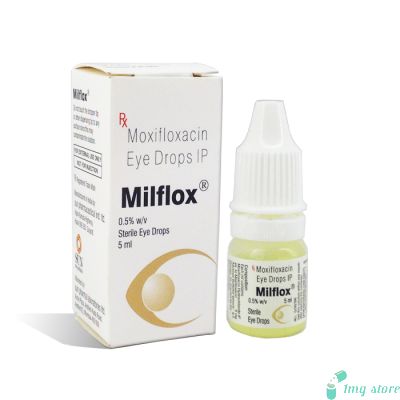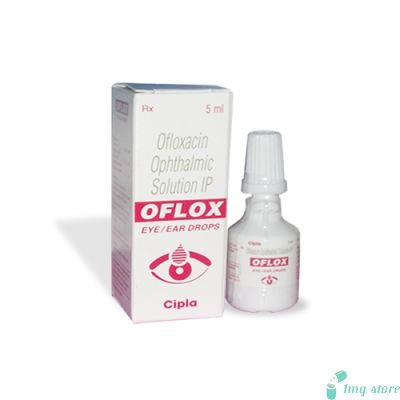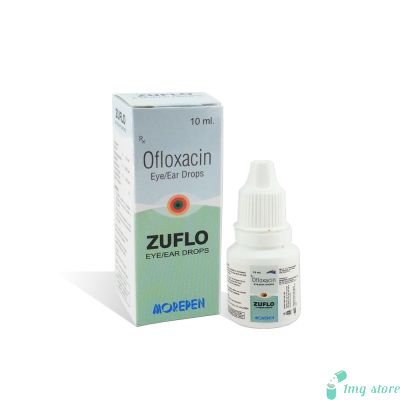Moxif Tablet (Moxifloxacin)
Buy Moxif Tablet (Moxifloxacin), Moxifloxacin, often marketed under the brand names Moxif, Avelox, and Vigamox, is a potent antibiotic belonging to the fluoroquinolone class. It is commonly prescribed to treat a wide range of bacterial infections.
What is Moxifloxacin?
Moxifloxacin, often marketed under the brand names Moxif, Avelox, and Vigamox, is a potent antibiotic belonging to the fluoroquinolone class. It is commonly prescribed to treat a wide range of Bacterial Infections. Moxifloxacin exerts its therapeutic effect by inhibiting bacterial DNA synthesis, thereby impeding the growth and replication of susceptible microorganisms. Moxifloxacin works by inhibiting an enzyme called DNA gyrase, which is essential for the replication and repair of bacterial DNA. DNA gyrase is responsible for unwinding and separating the DNA strands during bacterial cell division. By interfering with this process, moxifloxacin disrupts the bacteria's ability to replicate their DNA and ultimately prevents them from multiplying. It belongs to the fluoroquinolone class of Antibiotics and works by inhibiting bacterial growth, thereby helping to clear up bacterial Eye Infections and the body's immune system to better fight off the remaining bacteria. As a result, moxifloxacin helps to treat bacterial infections by effectively killing or inhibiting the growth of the bacteria causing the infection.
Moxifloxacin Tablet Brand Names:
Moxifloxacin Tablet is available under various brand names, including Avelox, Vigamox, and Moxif. These brand names represent different formulations and applications of the same active ingredient, offering options for various bacterial infections.
Moxifloxacin Dosage Information:
Standard Dosage:
For adults, the typical oral dosage of Moxifloxacin is 400 mg once daily, usually taken with a full glass of water and without regard to meals.
In certain infections, the duration of treatment may vary from 5 to 21 days, depending on the severity and type of infection.
Dosage for Special Populations:
Elderly patients or those with impaired renal function may require dose adjustments to prevent the accumulation of the drug.
Dosage adjustments are also necessary for patients with hepatic impairment.
Missed Dose:
If a dose is missed, it should be taken as soon as remembered. However, if it's close to the next scheduled dose, the missed dose should be skipped to avoid double dosing.
Overdose:
In case of overdose, seek immediate medical attention. Overdose symptoms may include dizziness, nausea, vomiting, and potential neurological effects.
Moxifloxacin Tablet Price:
For information about Moxifloxacin Tablet prices, you can conveniently check our website1mgstore.com. Our online platform provides easy access to updated pricing details, helping you make informed decisions about your medication needs.
Essential Safety Advice to Follow When Using Moxif Tablet (Moxifloxacin)
While Moxifloxacin, available as Moxif, Avelox, and Vigamox, is a valuable antibiotic, certain precautions should be observed to ensure safe and effective use:
- Tendon Rupture Risk: Moxifloxacin use has been associated with tendonitis and rare cases of tendon rupture, particularly in older adults and those concurrently using corticosteroids. Exercise caution and promptly report any tendon pain or inflammation.
- Central Nervous System Effects: Some individuals may experience central nervous system effects like dizziness, confusion, and hallucinations. Avoid activities requiring mental alertness until the extent of these effects is understood.
- Photosensitivity: Moxifloxacin can heighten sensitivity to sunlight, leading to severe sunburn. Shield yourself from excessive sun exposure and consider protective measures, such as sunscreen and protective clothing.
- Antibiotic Resistance: Misuse or overuse of Moxifloxacin can contribute to antibiotic resistance, compromising its future effectiveness. Use the medication only for bacterial infections as prescribed by a healthcare professional.
- Drug Interactions: Moxifloxacin may interact with medications affecting heart rhythm (QT prolongation), blood sugar levels, and anticoagulants. Inform your healthcare provider of all medications, including over-the-counter drugs and supplements, before starting Moxifloxacin.
- Renal and Hepatic Impairment: Adjustments in dosage may be necessary for individuals with impaired kidney or liver function. Consult your doctor to determine an appropriate treatment plan.
Some of the specific indications for Moxif Tablet (Moxifloxacin) include
Moxifloxacin, available under brand names such as Moxif, Avelox, and Vigamox, serves as a versatile antibiotic, addressing an array of bacterial infections. Its primary applications include:
- Respiratory Tract Infections: Moxifloxacin effectively combats respiratory infections, encompassing acute bacterial sinusitis, community-acquired pneumonia, and exacerbations of chronic bronchitis. It aids in reducing bacterial burden and alleviating symptoms.
- Skin and Soft Tissue Infections: Moxifloxacin plays a pivotal role in treating skin infections, cellulitis, and abscesses caused by susceptible bacteria. Its bactericidal action aids in eradicating infectious agents and facilitating wound healing.
- Intra-Abdominal Infections: Moxifloxacin proves valuable in intra-abdominal infections, including peritonitis and abscesses. By targeting diverse bacterial strains, it aids in controlling infection and preventing complications.
- Uncomplicated Urethral and Cervical Gonorrhea: Moxifloxacin serves as an alternative therapy for treating uncomplicated cases of gonorrhea, offering an effective option to combat this sexually transmitted infection.
- Eye Infections: As Vigamox, Moxifloxacin finds application in treating bacterial conjunctivitis. Its ophthalmic formulation addresses ocular infections, providing relief from discomfort and aiding recovery.
Some of the Secondary Effects of Moxif Tablet (Moxifloxacin)
Common Side Effects:
Nausea, diarrhea, and vomiting are common gastrointestinal side effects.
Headache and dizziness may occur, particularly during the initial days of treatment.
Serious Side Effects:
Tendonitis or tendon rupture, though rare, can occur, especially in patients over 60, in those using corticosteroids, and in kidney, heart, or lung transplant recipients.
Central nervous system effects like seizures, confusion, and hallucinations are rare but require prompt medical attention.
Allergic Reactions:
Allergic reactions to Moxifloxacin are uncommon but may include skin rashes, itching, and swelling, which require immediate medical attention.
Photosensitivity:
Moxifloxacin can increase sensitivity to sunlight, potentially leading to severe sunburn. Patients are advised to use protective measures while outdoors.
Answers to Common Inquiries About Moxif Tablet (Moxifloxacin)
Can Moxifloxacin be taken with dairy products?
It's advisable to avoid consuming dairy products close to taking Moxifloxacin, as calcium-rich foods can interfere with its absorption. Maintain a time gap of at least 2 hours between the medication and dairy consumption.
Is Moxifloxacin safe for children?
Moxifloxacin is generally not recommended for children under 18 due to the potential risks of musculoskeletal effects. Pediatric patients are usually prescribed alternative antibiotics suited for their age group.
Can Moxifloxacin be used for viral infections?
No, Moxifloxacin is specifically designed to target bacterial infections. It is ineffective against viral infections like the common cold or flu. Its misuse for viral infections can lead to antibiotic resistance.
Does Moxifloxacin interact with caffeine?
While there's no significant interaction reported between Moxifloxacin and caffeine, it's best to consume caffeine-containing beverages in moderation. Excessive caffeine intake might exacerbate certain side effects like nervousness or palpitations.
Can Moxifloxacin cause a decrease in blood sugar levels?
Yes, Moxifloxacin has been associated with hypoglycemia (low blood sugar) in some patients, particularly those with diabetes. Individuals on anti-diabetic medications should monitor their blood sugar levels closely while using Moxifloxacin and consult their doctor if any concerns arise.
Significant Drug Interactions that Require Attention For Moxif Tablet (Moxifloxacin)
Moxifloxacin may interact with drugs that prolong the QT interval, increasing the risk of serious cardiac arrhythmias.
Concurrent use of Moxifloxacin with corticosteroids may increase the risk of tendon rupture.
Antacids and Multivitamins:
Taking Moxifloxacin with antacids, sucralfate, and multivitamins containing iron or zinc can reduce its absorption. These agents should be taken at least 4 hours before or 8 hours after Moxifloxacin.
Warfarin and Anticoagulants:
Moxifloxacin can enhance the effects of anticoagulants like warfarin, potentially increasing the risk of bleeding.
Non-Steroidal Anti-Inflammatory Drugs (NSAIDs):
Concurrent use of NSAIDs with Moxifloxacin may increase the risk of central nervous system stimulation and seizures.
Class IA and III Antiarrhythmics:
Moxifloxacin should be used cautiously with class IA and III antiarrhythmics, as it can prolong the QT interval and lead to arrhythmias.
| Manufacturer | : | Torrent Pharma, India |
| Equivalent Brand | : | Avelox |
| Generic Search | : | Moxifloxacin |














